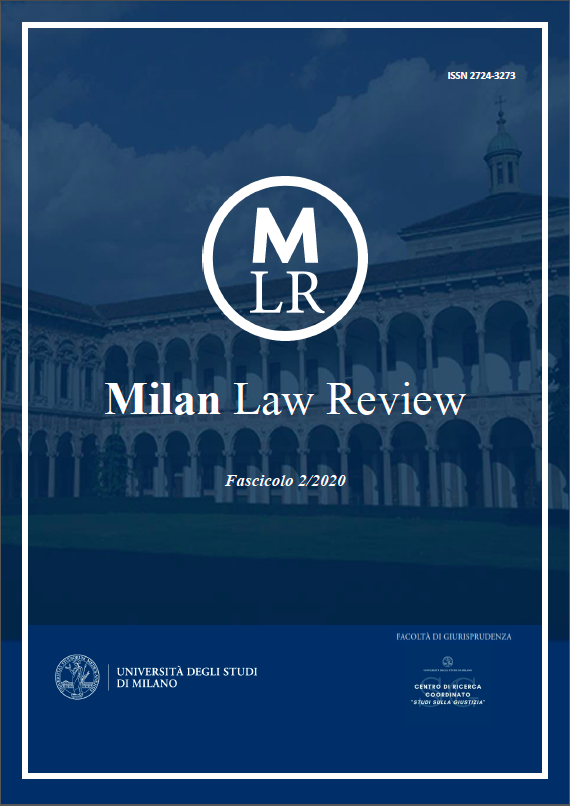A Comparative Study of the Political Question Doctrine in the Context of Political-System Failures: The United States and the United Kingdom
DOI:
https://doi.org/10.13130/milanlawreview/15192Parole chiave:
Comparative constitutional law, political question, gerrymander, prorogation, judicial reviewAbstract
Comparative constitutional law, political question, gerrymander, prorogation, judicial review
Downloads
Riferimenti bibliografici
Arvind T. T. & Stirton L., The Curious Origins of Judicial Review, 133 Sussex L. Rev. Q. 91 (2017).
Barkow R. E., More Supreme than Court? The Fall of the Political Question Doctrine and the Rise of Judicial Supremacy, 102 Colum. L. Rev. 237, 248–50 (2002)
Bartlett G. & Everett M., U.K. House of Commons Libr., Briefing Paper No. 03861, The Royal Prerogative 5 (2017).
Charles G. & Fuentes-Rohwer L. E., Dirty Thinking About Law and Democracy in Rucho v. Common Cause, Am. Const. Soc’y Sup. Ct. Rev. 2018–19 (Sept. 24, 2019).
Chemerinsky E., Op-Ed: The Supreme Court just abdicated its most important role: enforcing the Constitution, in L.A. Times (June 27, 2019);
Cherry, QC MP and Others for Judicial Review [2019] CSOH 70 (Scot.).
Cohn M., Form, Formula, and Constitutional Ethos: The Political Question/Justiciability Doctrine in Three Common Law Systems, in 59 Am. J. Comp. L. 675 (2011).
Dunt I., Supreme Court bombshell: Britain is working once again, Politics.co.UK (Sept. 24, 2019).
Ely J.H., Democracy and Distrust: A Theory of Judicial Review 103 (1980).
Ely J.H., Gerrymanders: The Good, The Bad and The Ugly, in 50 Stan. L. Rev. 607, 616–23 (1998).
Erlanger S., Britain Votes to Leave E.U.; Cameron Plans to Step Down, N.Y. Times (June 23, 2016).
Fried C., A Day of Sorrow in American Democracy, in The Atlantic (July 3, 2019).
Gill E., Judicial Answer to Political Question: The Political Question Doctrine in the United States and Israel, 23 B.U. Pub. Int. L. J. 245 (2014);
Gouin M.D., United States v. Alvarez Machain: Waltzing with the Political Question Doctrine, in 26 Conn. L. Rev. 759, 763–64 (1994)
Hassan S., Note, RE GCHQ Judgment & Prerogative of the Crown (Aug. 2019).
Leigh Grove T., The Lost History of the Political Question Doctrine, in 90 N.Y.U. L. Rev. 1908 (2015)
Mc Goldrick D., The Boundaries of Justiciability, in 58 Int’l & Comp. L. Q. 981, 984 (2010).
Mhango M., Is It Time for a Coherent Political Question Doctrine in South Africa? Lessons from the United States, 7 Afr. J. Legal Stud. 457 (2014).
Mueller B., What is Brexit? A Simple Guide to Why It Matters and What Happens Next, N.Y. Times (Dec. 13, 2019).
Mulhern J. Peter, In Defense of the Political Question Doctrine, in 137 Penn. L. Rev. 97, 102 (1988)
Purvis M., Lengths of Prorogation since 1900, U.K. Parliament: House of Lords Libr. (Oct. 3, 2019).
Sarma A., Political Prorogation: What Are the Implications for British Politics?, Harv. Pol. Rev. (Oct. 12, 2019).
Shirazi S., The U.K.’s Marbury v. Madison: The Prorogation Case and How Courts Can Protect Democracy, in U. Ill. L. Rev. Online 108 (2019)
Wines M., What is Gerrymandering? And Why Did the Supreme Court Rule on It?, N.Y. Times (June 27, 2019).




